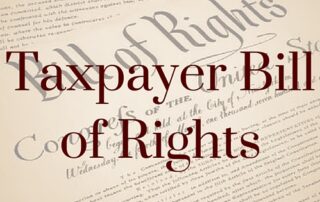Navigating the complexities of tax laws can be daunting for many taxpayers. However, understanding the Taxpayer Bill of Rights is crucial for ensuring fair treatment in the tax system. This comprehensive guide aims to demystify the Taxpayer Bill of Rights, explaining its significance and how it protects taxpayers.
What is the Taxpayer Bill of Rights?
The Taxpayer Bill of Rights is a set of fundamental rights that every taxpayer has when dealing with tax authorities. These rights provide a framework for respectful, fair, and equitable treatment. Understanding these rights is essential for taxpayers to ensure they are treated fairly and know what to expect when interacting with tax agencies.
Exploring the Core Rights
-
The Right to Be Informed:
- Taxpayers have the right to know what they need to do to comply with tax laws. This includes having access to clear explanations of the laws and IRS procedures in all tax forms, instructions, publications, notices, and correspondence.
-
The Right to Quality Service:
- Taxpayers deserve prompt, courteous, and professional assistance in their dealings with the IRS. They should expect clear and understandable communications and to speak to a supervisor about inadequate service.
-
The Right to Pay No More than the Correct Amount of Tax:
- Taxpayers have the right to pay only the amount of tax legally due, including interest and penalties, and to have the IRS apply all tax payments properly.
-
The Right to Challenge the IRS’s Position and Be Heard:
- Taxpayers have the right to object to formal IRS actions or proposed actions and provide justification with additional documentation. They should expect that the IRS will consider their timely objections and documentation promptly and fairly.
-
The Right to Appeal an IRS Decision in an Independent Forum:
- Taxpayers are entitled to a fair and impartial administrative appeal of most IRS decisions, including many penalties. They have the right to receive a written response regarding the Office of Appeals’ decision.
-
The Right to Finality:
- Taxpayers have the right to know the maximum amount of time they have to challenge the IRS’s position and the maximum amount of time the IRS has to audit a particular tax year or collect a tax debt. They should know when the IRS has finished an audit.
-
The Right to Privacy:
- Taxpayers have the right to expect that any IRS inquiry, examination, or enforcement action will comply with the law and be no more intrusive than necessary. They should expect that such actions respect all due process rights, including search and seizure protections.
-
The Right to Confidentiality:
- Taxpayers have the right to expect that their tax information will remain confidential. The IRS should not disclose any information unless authorized by the taxpayer or by law.
-
The Right to Retain Representation:
- Taxpayers have the right to retain an authorized representative of their choice to represent them in their dealings with the IRS. Taxpayers without the means to hire a representative may seek assistance from a Low Income Taxpayer Clinic.
-
The Right to a Fair and Just Tax System:
- Taxpayers have the right to expect fairness from the tax system. This includes considering all facts and circumstances that might affect their underlying liabilities, ability to pay, or ability to provide information timely.
Importance of the Taxpayer Bill of Rights
The Taxpayer Bill of Rights plays a critical role in the tax system by:
- Ensuring Fair Treatment: It provides a set of standards by which taxpayers should be treated by the IRS.
- Empowering Taxpayers: Knowing these rights empowers taxpayers to voice their concerns and defend themselves against unjust treatment.
- Enhancing Transparency: It encourages transparency in interactions between taxpayers and the IRS.
- Building Trust: Fair and respectful treatment builds trust between taxpayers and tax authorities.
Applying the Taxpayer Bill of Rights in Real Scenarios
Understanding these rights can have practical implications in various situations:
- Filing Taxes: Knowing your rights can help ensure you’re not paying more than you owe and understand your options if you disagree with an IRS assessment.
- Dealing with Audits: If audited, understanding your rights can help ensure the process is conducted fairly and respects your privacy.
- Facing Penalties: If facing penalties, these rights can guide you on how to appeal decisions and seek fair treatment.
Navigating Challenges with the IRS
If you believe your rights under the Taxpayer Bill of Rights have been violated, you can:
- Contact the IRS Directly: Reach out to the IRS to resolve the issue. You may also speak to a supervisor if you feel the service is inadequate.
- Seek Representation: You have the right to an attorney or other qualified representative to help navigate complex tax issues.
- Approach the Taxpayer Advocate Service: This independent organization within the IRS helps taxpayers facing hardships or systemic problems.
Summary
The Taxpayer Bill of Rights is a fundamental aspect of the tax system, ensuring that taxpayers are treated fairly, respectfully, and equitably. Understanding these rights is vital for any taxpayer navigating the complexities of tax laws and IRS procedures. By being informed, you can better manage your interactions with the IRS, safeguard your rights, and contribute to a more transparent and just tax system.
Remember, knowledge is power, especially when it comes to understanding your rights and responsibilities in the tax world. Stay informed, seek professional advice when necessary, and use the Taxpayer Bill of Rights as a tool to ensure fair treatment in all your tax matters.



